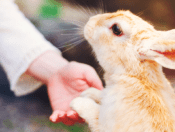We often talk of seasonal allergies in the Spring, but Autumn can be a time of suffering for animals with allergies, too. There are a variety of types of plants that pollinate in the Fall, and animals can be just as allergic to these as they are to Spring blooms. So, how can you tell if your dog or cat has Fall allergies and what can you do to ease their suffering if they do?
First, it is important to note that allergies in animals don’t typically show the same symptoms as allergies in people. While dogs and cats may sneeze and have runny eyes, the more common symptom of allergies for animals is a topic dermatitis, which is an itchy skin irritation.So, if you see your animal companion scratching much more than usual or scratching so hard that they develop skin sores or hot spots, schedule an appointment with your veterinarian to have him or her tested for allergies.
Another symptom of Fall allergies in cats and dogs is recurrent ear infections, which shows in your animal as increased frequency of ear scratching. There may also be an odor and discharge coming from the ear. If your dog or cat seems to have an ear infection, visit your veterinarian to get his or her ears checked. If your veterinarian rules out a bacterial infection, ask your doctor to consider the possibility that Fall allergies may be to blame.
If you and your veterinarian suspect Fall allergies,consider having allergy tests done to determine for sure. By testing for allergies, you not only determine what is bothering your animal companion, you can identify the specific culprits causing his or her discomfort.
Once you know which allergens are most bothersome, you can do your best to reduce or eliminate your animal companion’s exposure to those allergens. You likely can’t eliminate all allergic triggers, but you maybe able to get rid of some and you can certainly reduce most of them. For example, if it is determined that ragweed is problematic for your dog or cat, you can reduce his or her exposure to ragweed by limiting outside time and bathing your animal after time spent outdoors. We recommend using Nature’s Protection Flea & Tick Herbal Shampoo, a natural blend of herbs and essential oils that calms the irritation of allergic skin.
While your veterinarian may want to prescribe medications for your allergic animal, including steroids for severe cases, were commend using Nature’s Protection Allergy & Skin, an organic herbal blend that soothes allergic skin irritations. And if your dog or cat does sneeze and cough from his or her allergies, consider giving Earth Animal’s Cough, Wheeze,and Sneeze, an all-natural blend of organic herbs that helps support respiratory health.
Fall allergies may be common, but they can be conquered and you can help ease your animal companion’s suffering naturally.






